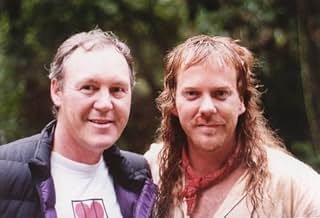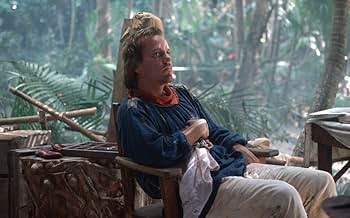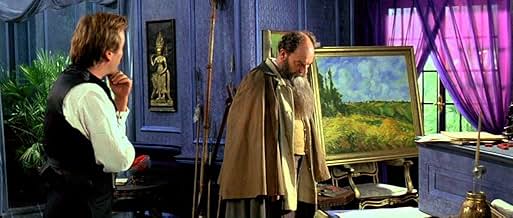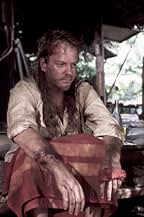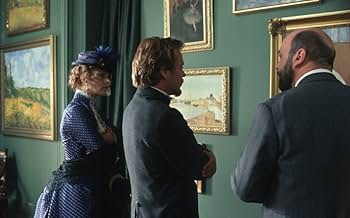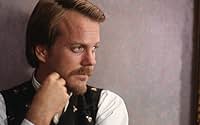A successful 19th century French stockbroker (Sutherland) leaves his profession to become an artist in Paris.A successful 19th century French stockbroker (Sutherland) leaves his profession to become an artist in Paris.A successful 19th century French stockbroker (Sutherland) leaves his profession to become an artist in Paris.
Jana Bittnerová
- Suzanne
- (as Jana Bittnerova)
Storyline
Did you know
- TriviaKiefer Sutherland's father, Donald Sutherland, also portrayed the artist Paul Gauguin in the film Oviri (1986).
- GoofsPissarro is misspelled "Pissaro" in the closing credits (but spelled correctly in the DVD captions).
- Quotes
Paul Gauguin: I have some advice of my own: you'd best mind your own fucking business.
- ConnectionsVersion of Gauguin the Savage (1980)
Featured review
The Post-Impressionist painter Paul Gauguin was famously portrayed by Anthony Quinn in the Van Gogh biopic "Lust for Life" in the fifties, a performance which won Quinn a "Best Supporting Actor" Oscar, even though his character is only on stage for eight minutes. In "Paradise Found" it is Gauguin's turn to take centre stage. This is not a complete biography of the painter- Van Gogh, for example, is never mentioned- but concentrates on two periods in his life.
In 1880 Gaugin is working as a stockbroker in Paris. His job pays well and he has become a fully paid-up member of the French haute bourgeoisie. He is also an amateur painter and an enthusiastic art collector. A chance meeting with the older artist Camille Pissarro, who later becomes a close friend, persuades him that his vocation is to paint full-time and he resigns from his job, much to the dismay of his Danish-born wife Mette.
Intercut with the scenes showing the beginning of Gauguin's artistic career are others set during a later part of his life. He is now separated from Mette and his family and living in Tahiti where he has gone to seek inspiration. He befriends the local inhabitants, whose way of life he admires, and clashes with the local missionaries and the French colonial authorities who he believes are threatening to destroy traditional Tahitian culture in their zeal to bring Christianity to the island. The film's title, an obvious play on that of Milton's "Paradise Lost", therefore has an ironic meaning. Gauguin believes that he has found Paradise in Tahiti, but it is a Paradise in danger of being "lost" again, and that danger, ironically, comes from the Christian religion of which Milton was so ardent an advocate.
Gauguin is played by Kiefer Sutherland whose father, Donald, also once played the artist, in the 1986 film "The Wolf at the Door", which I must admit I have never seen. Now there is nothing really wrong with Kiefer's performance here, but it does not really catch fire. The best of the cast is probably Alun Armstrong as Pissarro. Nastassja Kinski never really looks convincing as Mette, largely because of that blonde wig. (Someone obviously told the director, incorrectly, that there are no brunettes in Denmark).
It is not impossible to make a bad film about the life of a great artist- Derek Jarman managed it with the near-incomprehensible "Caravaggio"- but because so many famous have been passionate, larger-than-life individuals, films about them give great scope for film-makers and actors to produce something memorable. I am thinking not only of Quinn and Kirk Douglas in "Lust for Life" but also of Charles Laughton in "Rembrandt", Charlton Heston as Michelangelo in "The Agony and the Ecstasy", Colin Firth as Vermeer in "The Girl with a Pearl Earring" and Timothy Spall in Mike Leigh's recent "Mr Turner". "Paradise Found" is visually attractive, both in those scenes set in France and those taking place in the South Pacific, and overall it is not a bad film. In fact, it is quite a good one. I just felt that a film dealing with someone like Gauguin could have done better than "quite good". 7/10
In 1880 Gaugin is working as a stockbroker in Paris. His job pays well and he has become a fully paid-up member of the French haute bourgeoisie. He is also an amateur painter and an enthusiastic art collector. A chance meeting with the older artist Camille Pissarro, who later becomes a close friend, persuades him that his vocation is to paint full-time and he resigns from his job, much to the dismay of his Danish-born wife Mette.
Intercut with the scenes showing the beginning of Gauguin's artistic career are others set during a later part of his life. He is now separated from Mette and his family and living in Tahiti where he has gone to seek inspiration. He befriends the local inhabitants, whose way of life he admires, and clashes with the local missionaries and the French colonial authorities who he believes are threatening to destroy traditional Tahitian culture in their zeal to bring Christianity to the island. The film's title, an obvious play on that of Milton's "Paradise Lost", therefore has an ironic meaning. Gauguin believes that he has found Paradise in Tahiti, but it is a Paradise in danger of being "lost" again, and that danger, ironically, comes from the Christian religion of which Milton was so ardent an advocate.
Gauguin is played by Kiefer Sutherland whose father, Donald, also once played the artist, in the 1986 film "The Wolf at the Door", which I must admit I have never seen. Now there is nothing really wrong with Kiefer's performance here, but it does not really catch fire. The best of the cast is probably Alun Armstrong as Pissarro. Nastassja Kinski never really looks convincing as Mette, largely because of that blonde wig. (Someone obviously told the director, incorrectly, that there are no brunettes in Denmark).
It is not impossible to make a bad film about the life of a great artist- Derek Jarman managed it with the near-incomprehensible "Caravaggio"- but because so many famous have been passionate, larger-than-life individuals, films about them give great scope for film-makers and actors to produce something memorable. I am thinking not only of Quinn and Kirk Douglas in "Lust for Life" but also of Charles Laughton in "Rembrandt", Charlton Heston as Michelangelo in "The Agony and the Ecstasy", Colin Firth as Vermeer in "The Girl with a Pearl Earring" and Timothy Spall in Mike Leigh's recent "Mr Turner". "Paradise Found" is visually attractive, both in those scenes set in France and those taking place in the South Pacific, and overall it is not a bad film. In fact, it is quite a good one. I just felt that a film dealing with someone like Gauguin could have done better than "quite good". 7/10
- JamesHitchcock
- Feb 13, 2018
- Permalink
- How long is Paradise Found?Powered by Alexa
Details
Box office
- Budget
- A$10,000,000 (estimated)
- Runtime1 hour 33 minutes
- Color
- Sound mix
- Aspect ratio
- 2.35 : 1
Contribute to this page
Suggest an edit or add missing content



